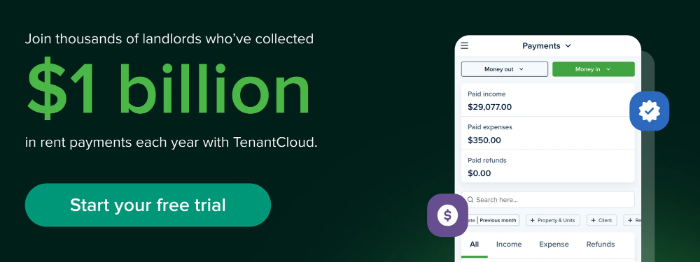When it comes to monthly rental payments, there are so many online payment platforms that you can use. From PayPal to Venmo to internal payment processors on property management websites, you might be wondering what the best option is. Many people even wonder if Venmo is safe to use anymore. Fortunately, if you’re curious about Venmo and its safety—as well as some alternatives you can use—we’ll explore all of that in this article.
While Venmo is popular, you’ll find out that using Venmo for rent is not always the best solution. There are far safer alternatives you can use! We’ll explore if you can pay rent with Venmo, whether Venmo rent payments are safe to use, what security measures are in place when you pay with Venmo, and the overall downsides of using Venmo for your rent online. If you’re eager to learn more, read on!
Can You Pay Rent with Venmo?
The short answer is yes, you can use Venmo for rent. However, it’s essential to know how it works and what this platform was created for. Venmo is usually used for peer-to-peer payment, but you can also offer online rent collection. The way that rent collection works on Venmo is straightforward but not exactly beneficial for landlords who want to save money and collect every cent of their rent.
This is because Venmo classifies rent payments as a business transaction, which means they are subject to a 3% Venmo transaction fee. Another challenge many people encounter when using Venmo rent payments is that they cannot set up recurring, automatic payments or even late fees. This is much like Zelle, another payment app, but it still means more work for landlords to ensure they can keep up with their rent collection.
Finally, if you do use Venmo rent payments, be warned that they may take one to three days to process. You will also encounter a limit on transfers of up to $299 initially, but once the user confirms their identity, you can accept up to $2,999.99 per week on Venmo transfers.
So, while the platform is user-friendly, you'll encounter some downsides and challenges. But is it safe to use? Let’s explore that next.
Is It Safe to Pay Rent with Venmo?
Truthfully, Venmo is as safe as any other payment app you might want to use for your rent. However, some issues may make it unsafe. The platform has worked hard to make its online rent payment service protected, from encrypting its site to providing users with multi-factor authentication to ensure that hacking is limited. It is a robust platform you can trust to protect your data and money as long as no one else has access to your Venmo account.
However, if you do make the mistake of labeling your rent payments as “goods and services” rather than as business transactions, you might get kicked off the platform. Venmo has been known to cancel accounts that try to disguise the fact that they are actually conducting business, so consider this a gentle warning if you do use the platform for real estate business!
Besides this potential safety issue, you could encounter problems if the tenant sends the payment to the wrong recipient. If this happens, you could not even receive your money, which could occur over something as simple as one incorrect number or letter in a name. There is no protection for the landlord or the tenant, so this is something to consider. Compared to other payment platforms, Venmo is not as safe because you could lose money or, worse, lose your account, too!
Compared to other payment methods like paying by check, credit card payment, cash payments, money order, debit card, or even direct deposit, Venmo offers a host of potential crises that you might have to mitigate if these situations arise.
What Are the Security Measures in Place for Paying the Rent with Venmo?
Unfortunately, as mentioned, few security measures exist for those paying the rent with Venmo. As landlords, this is understandably concerning, mainly because that means there’s little protection of your funds as they are transferred from the tenant to you! While measures have been taken to privatize payments and regular account monitoring is performed to ensure hacking or scams do not occur, Venmo differs from other payment processing platforms.
Venmo does not offer payment protection, nor do they block partial payments. This means that if your tenant cannot pay the total rent amount, you may receive only part of the payment instead of it being rejected. Additionally, you don’t have any access to landlord or credit reporting tools. This can be a real issue for landlords desiring trusted rental income monthly for their real estate investments.
The best payment processing platform for landlords is Avail, compared to Zelle, Venmo, and PayPal. For those who use Venmo, let’s explore a comprehensive list of the downsides we discussed of using Venmo exclusively for rent payments.
Overview of the Downsides of Paying the Rent with Venmo
When it comes to using Venmo rent payments, we’ve explored plenty of reasons why you might want to try another platform or payment app. Here is an overview of the top downsides of using this platform as compared to others:
- Limited Support for Errors: If your tenants attempt to pay partial rent payments, you cannot reject them. Additionally, setting up recurring or automatic payments is impossible. Landlords have little support for this payment app when conducting their real estate business.
- Limits on Transfers: Whether your tenants pay with a credit card, debit card, or even ACH payment transfer, there is a limit on transfers per week of up to $2,999.99. That means that you cannot collect more than that, making it hard to use this payment app to sustain multiple real estate properties.
Related: How ACH Payments Simplify Rent Collection for Landlords and Tenants
- Late Payments Due to Delays: Because Venmo takes up to three days to transfer the money, you could potentially encounter late rent payments from your tenants. This might not be an issue all the time, but this could lead to disputes that make it harder for you to retain your financial stability and manage your rental units.
- No Specialized Landlord Tools: Features like rent reminders and tenant screening are completely obsolete on this platform. That makes sense, considering this is primarily a payment app, not a rent collection app. However, the Venmo App still fails to achieve what other providers have already for landlords and property owners.
- Compliance Issues with Lease Terms: If you have specific terms in your lease agreement and tenant agreements, check these carefully with the Venmo app’s offerings. There is a chance that the Venmo app could violate what you and your tenant have agreed to regarding rent payments and collection.
These are the main downsides of using Venmo’s app for rent payments. If you are seeking a more trusted way to collect rent electronically and want to avoid the hassle of Venmo payments, why not try TenantCloud?
Try TenantCloud’s Internal Payment System as an Alternative to Venmo
While Venmo is not as safe as other electronic payment processing platforms, TenantCloud offers an all-in-one platform designer to empower landlords. This property management software helps you list your properties, collect rent payments, and manage your real estate investments easily.
From support for partial payments, recurring payments, and automatic payments, you can run your business without hassle. The platform also offers built-in rent reminders and tenant screening, and there are no hidden transaction fees for your tenants.
If you’re ready to experience the future of property management for your rental property, visit TenantCloud today to get started.








